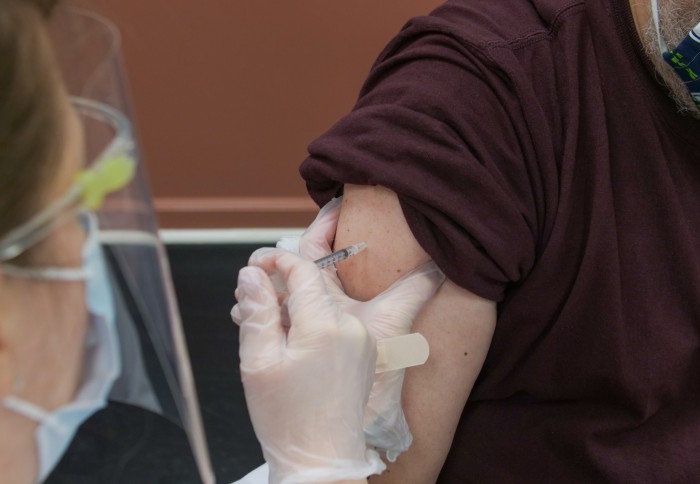Confidence in coronavirus vaccines is rising globally, survey suggests

People’s willingness to get vaccinated against the coronavirus is rising, according to a new report on global attitudes towards vaccines.
More than half of those surveyed (54%) would take a vaccine if it was offered to them next week. This is an increase from November when the same survey, which ran across 15 countries* and included 13,500 people each time, showed that just 4 in 10 (41%) would be willing to get vaccinated at the time.
However the survey from Imperial College London’s Institute of Global Health Innovation (IGHI), in collaboration with YouGov, has highlighted major differences in attitudes towards vaccines across the world.
"Leaders must act now to help more people understand the benefits of being vaccinated." Dr David Nabarro Co-Director, IGHI
People in the UK were the most willing to have a coronavirus vaccine overall (78%), followed by Denmark (67%). While France had the highest proportion of respondents who stated that they would not take a vaccine (44%), the number of French people surveyed who strongly agreed that they would take a vaccine has doubled from just 15% in November to 30% in January.
The UK also had the biggest increase in the share of people who strongly agree that they’d take a vaccine, from 41% in November, shortly before the first approval of a coronavirus vaccine, to 70% in January. Whereas in four countries – Australia, Japan, South Korea and Singapore – willingness to take a vaccine has decreased since November, with Japan showing the least willingness to currently get vaccinated (33%), followed by Singapore (35%).
The survey also shows that worry over vaccine side effects has decreased in 9 of the 15 countries, with fewer than half of respondents overall (47%) reporting concern over potential harm from a vaccine, down from 54% in November. Respondents’ confidence in the ability of their country’s health authorities to deliver an effective vaccine has also grown, with almost 6 in 10 (58%) stating that they believe their government can provide one, up from 51% in November.
Dr David Nabarro, IGHI co-director and WHO Special Envoy on COVID-19, said: “It is very encouraging to see that as a number of safe and effective coronavirus vaccines are being rolled out across the world, there has been an apparent positive shift in people’s perceptions of these products. As vaccines will play a vital role in controlling the pandemic, leaders must act now to help more people understand the benefits of being vaccinated against COVID-19 and make sure that no one is left behind.”
Growing trust in COVID-19 vaccines
The report, co-led by IGHI's Melanie Leis and Sarah P Jones, is part of a major ongoing effort to monitor changing patterns of health-related behaviours and attitudes during the pandemic. Since April 2020 the researchers have surveyed over 470,000 global citizens so that decision-makers can respond appropriately based on their country’s needs.
The most recent survey, which ran between 4th and 24th January with contribution from the WHO working group on measuring behavioural and social drivers of COVID-19 vaccination, shows that most people around the world trust vaccines, with two-thirds (66%) stating strong or moderate trust and only 12% reporting no trust at all. It also found that the majority of people (66%) believe that having a vaccine is important for their health.
Uneven access
However it has also highlighted the difficulties that some people face in accessing a vaccine, with more than half (54%) reporting that it would be hard for them to get one. People in South Korea and Japan reported the greatest difficulty in accessing a vaccine at over two-thirds (68%, 67%), while Norway and Denmark reported the least (47%, 49%).
"International collaboration is essential in the necessary strive toward vaccine equity." Melanie Leis Director, Big Data and Analytical Unit, IGHI
Melanie Leis, co-project lead and director of IGHI's Big Data and Analytical Unit, said: “Openness and transparency are vital to ensure that governments have access to the best evidence to inform policy. All of our data are freely available and we hope that our ongoing efforts to monitor the situation globally and offer country comparisons will enable better international collaboration, which is essential in the necessary strive toward vaccine equity.”
Vaccines provide the best protection against COVID-19 and a number of coronavirus vaccines are now approved both in the UK and globally. Imperial College London has developed self-amplifying RNA vaccine technology to target the virus which is now being explored for its potential to target new variants of SARS-CoV-2 or other viruses as they emerge.
*Countries included in this global comparison are as follows: Australia, Canada, Denmark, Finland, France, Germany, Italy, Japan, The Netherlands, Norway, Singapore, South Korea, Spain, Sweden, and the United Kingdom.
Visit the open data dashboard: www.coviddatahub.com
Article text (excluding photos or graphics) © Imperial College London.
Photos and graphics subject to third party copyright used with permission or © Imperial College London.
Reporter
Justine Alford
Institute of Global Health Innovation